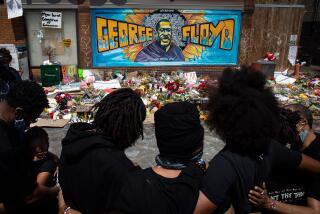Floyd Plays It Safe, Ends Up Sorry
- Share via
AUGUSTA, Ga. — It has taken the British a couple of hundred years to strike back at the colonials, but they have bloody well done so, marching in formation across rolling green fields, sticks in hand, at the specific and extremely painful expense of a 47-year-old former U.S. Army brat name of Raymond Floyd.
Beyond the more obvious drama of attempting to become the oldest Masters golf champion ever, Ray Floyd had a chance to erase the memory of one of the truly aggravating experiences of his career, the failure of the U.S. team he captained to bring home the Ryder Cup from Great Britain last summer. Instead, Floyd’s playoff defeat at the hands of Nick Faldo permitted a Brit to win this uniquely American sporting event for the third consecutive year.
“You cannot imagine, just cannot imagine how this feels,” Floyd said. “I have never felt like this. I have never had anything affect me the way this is affecting me.”
In America we have an unhappy habit of denying sympathy to the rich and famous, simply because they have what they have. The fact that Raymond Floyd has been winning professional golf tournaments for 27 years and has a wall full of glass-framed magazine covers in the den of his $2 million home on Miami’s Biscayne Bay might somehow strain the notion of feeling sorry for a golfer, of all people, just because the poor soul had a bad day.
But Floyd’s heartache was real. Here he was, four strokes ahead and six holes away from the golfing academy’s Best Costume award, Augusta National’s green sport coat. He was out there pumping his fists Kirk Gibson-style after a birdie at No. 12, shrugging off a ball misdirected by his playing partner’s marker at No. 14, clapping for himself after a par-saving putt at No. 16, then suddenly failing to find his way home safely in what became a man-eating obstacle course of water and sand.
The putts got longer and longer, and the approach shots pinballed from bunker to bunker, and finally a tee shot died a cruel underwater death. By the end, Floyd’s fate had been so far removed from his own hands that he could not even putt out. He could only pick up. Pick up his golf ball, pick up the pieces.
“I competed marvelously well,” Floyd said at one point afterward, sounding distinctly British.
He tried to tell himself and anyone else willing to listen that it mattered not who came along to conquer him. Beaten was beaten. Another first prize for Faldo? Good for Faldo. Long live the king. “It doesn’t matter who he is or where he’s from,” Floyd maintained.
It just as easily could have been Langer the German, or Ozaki the Japanese, or Ballesteros the Spaniard out there making the charge against him, making three birdies over the last six holes the way Faldo did. Floyd said he would have felt just as bad. He also felt he would have played the same way, playing everything safe, taking no unnecessary chances, daring the challenger to do the catching.
Behind the ropes of Augusta’s gallery, more than one person was getting sleepy watching Floyd. He had this tournament in his Bell Telephone-sponsored bag. He had another green jacket--maybe the same one he won 14 years ago--waiting to be slipped over his triangle-patterned, Nabisco cookie-box shirt. Spectators were yawning, same way they have at all the other lopsided championship events of the past calendar year--the NBA finals (swept in four games), World Series (also swept in four), Super Bowl (a 45-point rout) and Final Four (a 30-point rout).
Suddenly, Faldo came on strong.
Floyd was supposed to be at his best as a front-runner, a horse more than happy to get out early. He was up by eight strokes after three rounds when he won in 1976. He was the ice-water man, the soldier’s son from Fort Bragg, N.C., who preferred to march out front.
Of course, there was a PGA tour event a few years ago in Westchester County, N.Y., that Floyd was leading on the final day, until his nerves so got the best of him that he blew up to 77 and lost. That day he said: “I wanted to win so badly that I wasn’t Ray Floyd out there.” He no longer played like himself.
And that is precisely what happened at the 54th Masters. Ray Floyd stopped being Ray Floyd. He played to safe portions of greens and lagged putts short. Not until he really took a whack at a long, treacherous, toboggan-run of a putt at the 17th did he show any boldness. He played with considerable caution and care--”even though it’s not my nature.”
It cost him dearly. It became his Masters of disaster. It turned into another Grand Slam for Great Britain, during a weekend when 1988 champion Sandy Lyle had just become the butt of half the jokes being told in Augusta for having conked more spectators’ skulls with errant shots over the course of a few days than Gerald Ford had in his entire term in the Presidency.
Now it is Ray Floyd who has the headache, and there isn’t much he can do about it. Nobody his age has ever won the British Open. Guess he should shoot for that.
More to Read
Go beyond the scoreboard
Get the latest on L.A.'s teams in the daily Sports Report newsletter.
You may occasionally receive promotional content from the Los Angeles Times.










